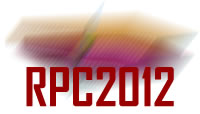Speaker
Lorenzo Paolozzi
(INFN - Roma2)
Description
Very large systems of RPCs with 2 mm gas gap are presently working at LHC as
muon trigger detectors. In order to conceive a new generation of RPCs, fully
adequate to the needs of the high luminosity super-colliders of the next future,
two aspects have to be reconsidered: the gap width which determines the
amount of charge delivered in the gas per detected avalanche and the front end
electronics which determines the minimum charge that can be discriminated
from the noise. Both aspects have a crucial effect on the rate capability.
We present here the results of a cosmic ray test carried out on small size RPCs of
gap width 2.0, 1.0 and 0.5 mm respectively. The wave forms of both the prompt
signal due to the fast drifting electrons and the signal generated in the HV
circuit, which is dominated by the slow ion drift, are recorded for each detected
cosmic muon. The analysis of these signals is crucial to understand the RPC
working features.
Author
Dr
Barbara Liberti
(INFN Roma Tor Vergata)
Co-author
Lorenzo Paolozzi
(INFN - Roma2)

